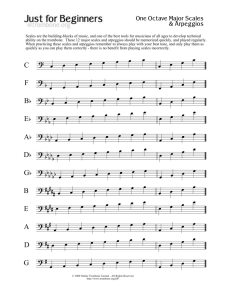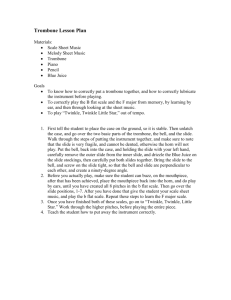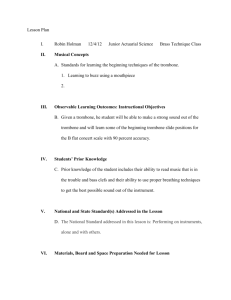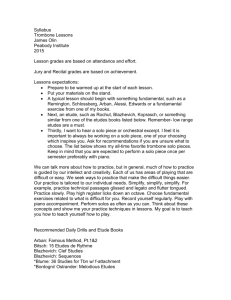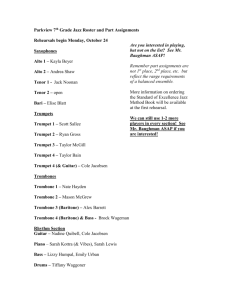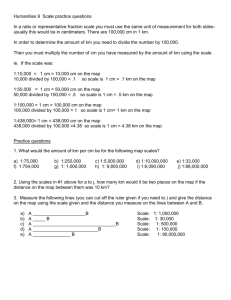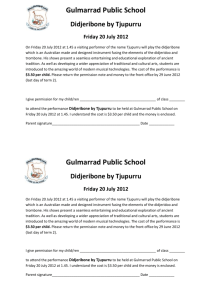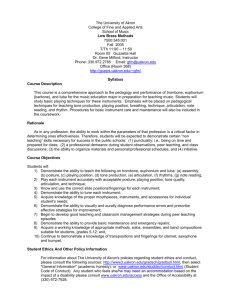EKU Trombone Methods Syllabus - Eastern Kentucky University
advertisement
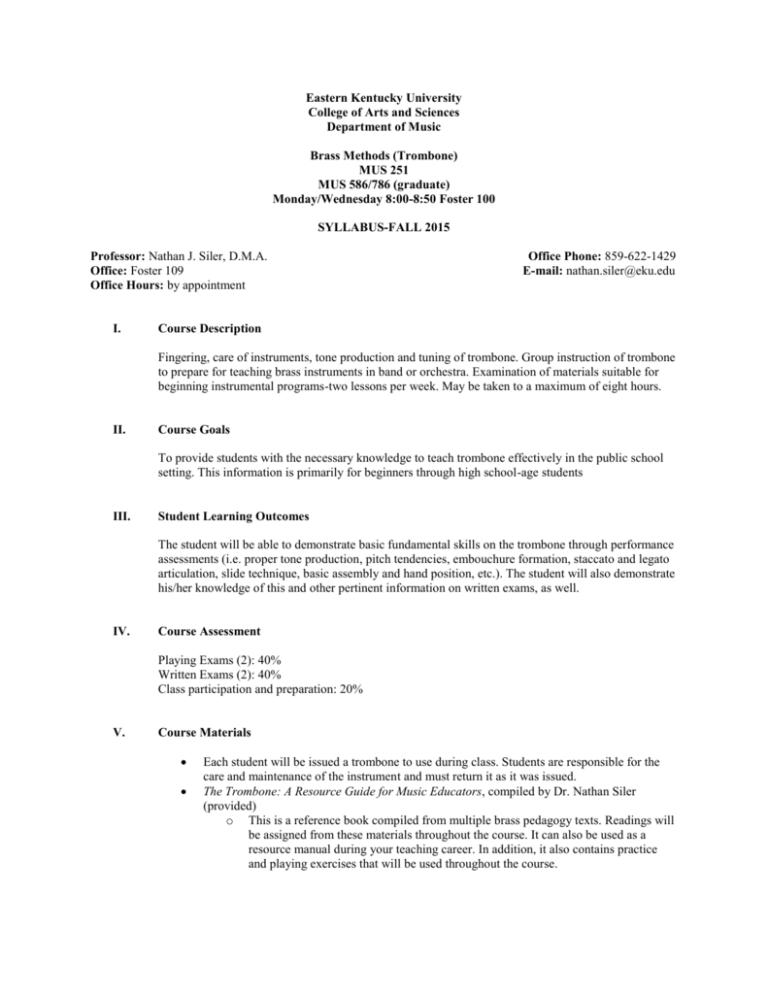
Eastern Kentucky University College of Arts and Sciences Department of Music Brass Methods (Trombone) MUS 251 MUS 586/786 (graduate) Monday/Wednesday 8:00-8:50 Foster 100 SYLLABUS-FALL 2015 Professor: Nathan J. Siler, D.M.A. Office: Foster 109 Office Hours: by appointment I. Office Phone: 859-622-1429 E-mail: nathan.siler@eku.edu Course Description Fingering, care of instruments, tone production and tuning of trombone. Group instruction of trombone to prepare for teaching brass instruments in band or orchestra. Examination of materials suitable for beginning instrumental programs-two lessons per week. May be taken to a maximum of eight hours. II. Course Goals To provide students with the necessary knowledge to teach trombone effectively in the public school setting. This information is primarily for beginners through high school-age students III. Student Learning Outcomes The student will be able to demonstrate basic fundamental skills on the trombone through performance assessments (i.e. proper tone production, pitch tendencies, embouchure formation, staccato and legato articulation, slide technique, basic assembly and hand position, etc.). The student will also demonstrate his/her knowledge of this and other pertinent information on written exams, as well. IV. Course Assessment Playing Exams (2): 40% Written Exams (2): 40% Class participation and preparation: 20% V. Course Materials Each student will be issued a trombone to use during class. Students are responsible for the care and maintenance of the instrument and must return it as it was issued. The Trombone: A Resource Guide for Music Educators, compiled by Dr. Nathan Siler (provided) o This is a reference book compiled from multiple brass pedagogy texts. Readings will be assigned from these materials throughout the course. It can also be used as a resource manual during your teaching career. In addition, it also contains practice and playing exercises that will be used throughout the course. VI. Attendance Policy Since this portion of the class lasts for only eight weeks, students are allowed only two absences without affecting their grade, regardless of the reason. Three tardies will equal one unexcused absence. A students entering class after 8:15 will be considered absent for that class. Students must be present on test days. There will be no make-up tests unless extremely unusual circumstances have occurred (documentation must be provided). VII. Class Participation and Preparation Class participation and preparation will be reflected in 20% of the final grade. Students will be assigned exercises and materials from the packets to practice and have prepared for each class session. Students are expected to practice each day for a minimum of 30 minutes. Daily practice is what will make the difference in the overall achievement and knowledge of the instrument. Please have everything you need during each class session (i.e. instrument, reference book, notebook, etc.) It is very important that you keep up with all playing and reading assignments, as this class moves very quickly through the given materials. VIII. Playing Exams These tests will occur in the middle and at the end of the trombone class. You will be tested on a prepared selection that will be given to you at least one week prior to each test. Throughout the semester, each student will have several assignments to demonstrate during class time. You will be graded based on a rubric provided in the resource manual. IX. Written Exams and Note Preparation Two written exams will be given, one at the midpoint, the other on the next to last class meeting. Each will include all the major points covered in class to that point. It is wise to take concise and complete notes during each class session, as you will need to refer back to them in the future. Anything discussed in class could be added to the written exams. X. Grading Scale 94-100=A 90-93=A87-89=B+ 84-86=B 80-83=B77-79=C+ 74-76=C 70-73=C- 67-69=D+ 64-66=D 60-63=D0-59=F XI. NOTIFICATION OF LAST DAY TO DROP COURSE See the Colonel’s Compass online http://colonelscompass.eku.edu/deadlines-adddrop-refunds XII. DISABILITY STATEMENT A student with a “disability” may be an individual with a physical or mental impairment that substantially limits one or more major life activities, such as learning, seeing or hearing. Additionally, pregnancy accompanied by medical conditions that causes a similar substantial limitation may also be considered under the ADA. If you are registered with the Office of Services for Individuals with Disabilities, please obtain your accommodation letters from the OSID and present them to the course instructor to discuss any academic accommodations you need. If you believe you need accommodation and are not registered with OSID, please contact the office in Whitlock Building Room 361, by email at disserv@eku.edu or by telephone at (859) 622-2933. Upon individual request, this syllabus can be made available in an alternative format. http://academicaffairs.eku.edu/syllabi/ XIII. ACADEMIC INTEGRITY POLICY Students are advised that EKU's Academic Integrity policy will strictly be enforced in this course. The Academic Integrity policy is available at the policy website. Questions regarding the policy may be directed to the Office of Academic Integrity. For current University policies and regulations, please go to EKU's Policy Website. http://policies.eku.edu/sites/policies.eku.edu/files/policies/4.1.3_academic_integrity_policy_bor_6_11_201 2_editorial_revision_0.pdf XIV. Course Outline October 19: Class 1 o Syllabus o Schedules o Resource manual o Instrument assignments o “When should students start on trombone?” o “What should teachers look for in beginner trombonists?” o Discussion of history of trombone (Hunt/Bachelder, Ch. 10, pp. 76-77) October 21: Class 2 o Instrument assembly and care o Slide maintenance o Hand position o Making the first sounds (Embouchure) o Playing test rubric o Position chart o Basic Range Homework: Embouchure/Breathing/First Exercises Hunt/Bachelder: Ch. 3 &4 Stanley: p. 68-73 Griffiths: Ch. 2; The Diaphragm Vining: The Truth About the Diaphragm October 26: Class 3: Each student should be prepared to play the First Exercises o Embouchure (cont.) o Breathing, breath control, amount of air for this instrument, breathing exercises and devices, breath control in playing exercises, introduce first playing exercise, discuss H/B, Ch. 3&4 Homework: Instrument assembly and first sounds Stanley: 64-69 Hunt/Bachelder: Ch. 1-2, Griffiths: Ch. 2 Homework: Second Exercises/memorize Bb flat scale and arpeggio Read Harmonic Series (Siler/Haddix/H/B, Ch. 1) Articulation o H/B, Ch. 5 o Griffiths, Ch. 6 October 28: Class 4: Be prepared to play Bb major from memory in class o Overtone series discussion o Pitch tendencies o Range (continued) o “T” articulation o Alternate positions Homework: Practice Chromatics Memorize Bb chromatic scale November 2: Class 5: Be prepared to play Bb chromatic from memory in class o Continue overtone and pirch tendencies Homework: Lip Slurs/Legato Tongue (Edwards/Fink) Lip Slurs and F Major November 4: Class 6: Be prepared to play lip slurs and F major scale o Continue work on slurs and scales o Review for first exam November 9: Class 7: FIRST WRITTEN AND PLAYING EXAMS o Playing test over Bb and F major scales, Bb chromatic scale, Etudes 1-4 November 11: Class 8: Be prepared to play G major scale o Begin discussion of legato technique o Large bore tenor trombone with F-attachment, its overtone series/tuning (refer back to H/B, ch. 10); instrument manufacturers o Mouthpiece discussion o Bass trombone/alto trombone Homework: Continue More Scales Memorize Eb Major Scale H/B, Ch. 7: Vibrato November 18: Class 10: Be prepared to play Eb Major Scale (legato style) o Mute presentation o Vibrato discussion Homework: Practice More Legato and More Scales Memorize C Major November 16: Class 9: Be prepared to play C major scale (legato style) o Discussion of upper register/lower register o Clefs o Continue More Scales/Etudes Homework: Practice Fink Legato Exercises and G major (from More Scales) Mouthpieces: H/B, Ch. 6 Griffiths, Ch. 24 Homework: Practice all scales and final test playing etudes November 23: Class 11: Be prepared to play all scales and exercises so far o Solo and ensemble literature o Technique books o Texts Homework: Practice all scales and final test playing etudes November 25: No Class (Thanksgiving Holiday) November 30: Class 12 o The Trombone Virtuoso o Trombone soloists/works of substance for the orchestral trombonist o Practice all scales and final playing test etudes o Review for final written exam December 2: Class 13 o FINAL WRITTEN EXAM FINALS WEEK: TBA o FINAL PLAYING TEST over all scales (Bb, F, G, C, Eb and Bb chromatic), etudes 5-7 o Instruments will be returned after class
